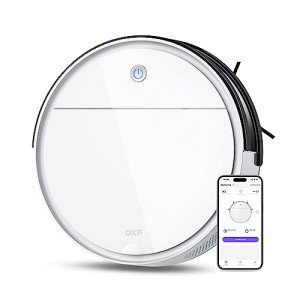15 Best Pinterest Boards To Pin On All Time About Autonomous Vacuum
The Rise of Autonomous Vacuums: Revolutionizing Home Cleaning
In the age of innovation, family chores are ending up being increasingly automated, and among the most noteworthy improvements in this realm is the autonomous vacuum. These intelligent cleaning robots are developed to alleviate the drudgery of traditional vacuuming, making them popular among time-strapped homes. This post explores the evolution, functionality, advantages, and restrictions of autonomous vacuums, together with a comparison of a few of the leading models on the market today.
What is an Autonomous Vacuum?
An autonomous vacuum, also known as a robotic vacuum cleaner, is a little, automatic device that navigates through your home to tidy floorings without human intervention. Geared up with sensors, cameras, and advanced software application, these vacuums can identify obstacles, avoid stairs, and optimize cleaning paths. They usually run from a rechargeable battery, going back to their charging stations when their power is low or when cleaning tasks are finished.
Secret Features of Autonomous Vacuums
Smart Navigation:
- Utilizes sensors and algorithms to map the environment.
- Can browse complicated designs and prevent challenges.
Scheduling:
- Allows users to set cleaning times.
- Can operate when your house is empty, making sure minimal disturbance.
Connectivity:
- Many models connect to Wi-Fi, permitting app control and combination with smart home systems.
- Users can tailor settings, check cleaning status, and get notifications through mobile applications.
Suction Power:
- Varies in between models; some deal adjustable suction settings for various floor types.
- High-end models include effective suction efficient in choosing up animal hair and deep dirt.
Floor Type Adaptability:
- Capable of cleaning carpets, hardwood, tiles, and more.
- Particular designs concentrate on tailored cleaning for multiple surface areas.
The Advantages of Using Autonomous Vacuums
1. Time-Saving
Among the most considerable benefits of autonomous vacuums is the amount of time they save. Instead of investing Kory Estrello pushing a standard vacuum, homeowners can set robotic vacuums to tidy while they are participated in other activities.
2. Consistent Cleaning Schedule
With the capability to set up cleanings, these vacuums make sure that areas are routinely cleaned, resulting in a cleaner home in general. Regular cleaning helps maintain indoor air quality, specifically for households with allergies or asthma.
3. Smart Home Integration
Numerous autonomous vacuums can be integrated with clever home systems for seamless operation. Homeowners can control their vacuums by means of voice commands through devices like Amazon Alexa or Google Assistant, improving user benefit.
4. Compact Design
The slim profile of these devices permits them to clean up under furnishings, such as sofas and beds, where traditional vacuums frequently can not reach.
5. Pet-Friendly
For family pet owners, autonomous vacuums can be a game-changer, as they are typically geared up with specialized features for picking up pet hair and dander, adding to a cleaner home environment.
Limitations of Autonomous Vacuums
In spite of their lots of benefits, autonomous vacuums likewise have constraints:
1. Limited Deep Cleaning
While these vacuums effectively preserve cleanliness, they may not replace the efficiency of a deep tidy offered by conventional vacuums, especially for greatly soiled locations.
2. Capability Constraints
The majority of autonomous vacuums included little dust bins that need to be cleared frequently, especially in bigger homes or homes with family pets. This can be a hassle for some users.
3. Navigation Challenges
Although navigation innovation is continuously enhancing, some designs may struggle with specific layouts, especially intricate spaces with various barriers or very small spaces.
4. Rate Point
While costs have ended up being more accessible, high-end models can still be quite expensive, posturing a barrier for some customers.
Comparison of Top Autonomous Vacuum Models
Design
Smart Features
Battery Life
Suction Strength
Cost Range
iRobot Roomba 980
App Control, Voice Assistant
120 minutes
1700 Pa
₤ 700 – ₤ 900
Roborock S6 MaxV
Advanced Mapping, Connectable
180 minutes
2500 Pa
₤ 600 – ₤ 800
Ecovacs Deebot Ozmo
Mopping, Smart Home
110 minutes
1500 Pa
₤ 450 – ₤ 700
Neato Botvac D7
Laser Navigation, Custom Zones
120 minutes
2000 Pa
₤ 800 – ₤ 900
Shark IQ Robot
Self-Emptying Base, Smart Map
90 minutes
1500 Pa
₤ 400 – ₤ 600
Significant Takeaways
- Smart Features: Consumers ought to prioritize models offering robust clever features for benefit and performance.
- Battery Life: A longer battery life is helpful for larger home.
- Suction Strength: Depending on household needs, differing suction power can significantly impact cleaning effectiveness.
FAQs about Autonomous Vacuums
Q1: How do I maintain my autonomous vacuum?
A: Regular maintenance includes cleaning the brushes, clearing the dustbin, and inspecting for obstructions. In addition, keeping the sensing units clean up will assist maintain navigation accuracy.
Q2: Can robotic vacuums tidy carpets and carpets?
A: Yes, lots of robotic vacuums are developed to successfully clean both hard surface areas and carpets. However, suction power might differ based upon the model.
Q3: Do robotic vacuums need Wi-Fi?
A: While many autonomous vacuums benefit from Wi-Fi connection for app control and updates, some designs can operate independently without a wireless connection.
Q4: How often should I run my robotic vacuum?
A: It depends upon your living scenario, however running it numerous times a week is typically advised, especially for homes with family pets.
In conclusion, autonomous vacuums represent a substantial improvement in home cleaning technology, appealing convenience and performance. While these devices might not entirely change standard vacuum, they are undoubtedly useful in preserving a clean living environment. As innovation continues to develop, the future of home cleaning looks appealing, and these devices are at the leading edge of the transformation.
